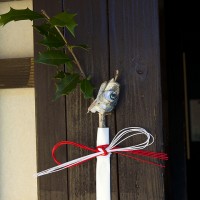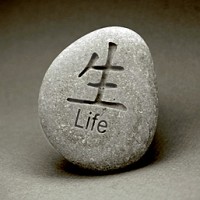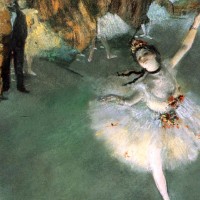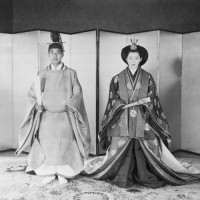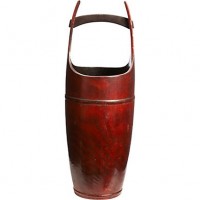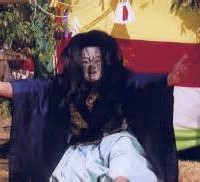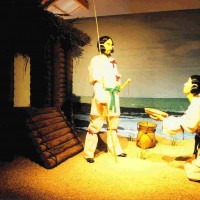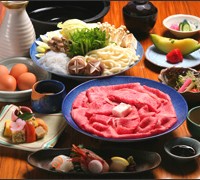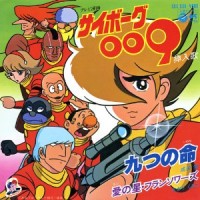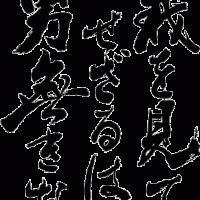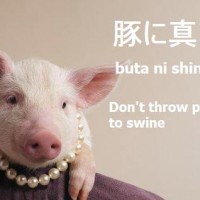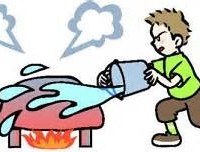blog
Tuesday: Nihon-no Kotowaza
08/05/2015 blog
Iwashi-no Atama-mo Shinjin-kara [Vocaburary] Iwashi: sardines (considered as “nothing” or “no value”) Atama: head Shinjin: faith; belief; piety; devotion; reverence for God [Translation] Faith will move a mountain. / Anything can be deified. (Kanji of “Iwashi”)
Tuesday: Nihon-no Kotowaza
08/05/2015 blog
Inochi Atte-no Monodane [Vocaburary] Inochi: life Atte-no: on the condition that life sustains Monodane: the basis of all [Translation] Life must be the first consideration. / While there is life, there is hope.
Tuesday: Nihon-no Kotowaza
08/05/2015 blog
Ichinichi-no Kei-wa Asa (Soochoo)-ni Ari [Vocaburary] Ichinichi: a day Kei: a plan; a scheme Asa: morning Soochoo: early morning [Translation] The day’s plan should be made out early in the morning.
Tuesday: Nihon-no Kotowaza
08/05/2015 blog
Ichiji-ga Banji [Vocaburary] Ichiji: one thing Banji: everything; all things; all [Literal Translation] One thing is everything. [Translation] He that will steal a pin will steal a better thing. / This case serves as a criterion for all the rest.
Monday: One Point Nihongo Clinic
08/05/2015 blog
Particles – Difference between “To” and “Ya” (Degas) 1) Mari-san-to Kenji-san-wa Kookoo Ninenseidesu. [Mari and Kenji are second year high school students.] 2) Watashi-wa Eiga-to Ongaku-ga Sukidesu. [I like movies and music.] 3) Tukue-no Ue-ni Hon-to Nooto-ga Arimasu. [There is a book and a notebook on the desk.] 4) Getsuyobi-to Suiyobi-to Kinyobi-ni Sakkaa-no Renshuu-ga Arimasu. [We have soccer training on Monday, Wednesday and Friday.] <Question> Can you replace all these “to” with “ya” in Japanese? 1) No. This is a statement regarding Mari and Kenji. Focus is placed only on Mari and Kenji. 2) No. Refer to the conversation below: Tomoko: Gaka-no …
Friday: Kojiki (「乞食」ではなく『古事記』ですヨ!!) #23 – 5/5
08/04/2015 blog
Umisachibiko and Yamasachibiko (Emperor Akihito and Empress Michiko) Hoori was so smart that all his plans worked very well. Toyotamabime came out to see who was out there and found him. At first sight, she believed that he was her Mr. Right! She came back in and reported that to her father god of the sea. The god came out to see and instantly identified who he was! He came back in again to prepare the place appropriate to invite one of the Heavenly God’s sons in. He spread out the skins of sea lions. On top of those, he spread out the silk mats. Then, he brought Hoori in …
Friday: Kojiki (「乞食」ではなく『古事記』ですヨ!!) #23 – 4/5
08/04/2015 blog
Umisachibiko and Yamasachibiko (Water Pail) When Hoori asked the servant for some water, she offered it in a beautifully ornamented water pail. Hoori didn’t drink any, but he untied his gem necklace and took out one of those gems, putting it into his mouth to spit it out into the water pail! Amazingly, due to his magical power of his saliva, the gem got stuck to the pail, which the servant couldn’t get rid of. Hoori’s plan was – Toyotamabime’s servant would take the pail back to her to show her what happened. Then, she would notice someone was waiting for her outside. Hoori’s plan worked out very well. …
Friday: Kojiki (「乞食」ではなく『古事記』ですヨ!!) #23 – 3/5
08/04/2015 blog
Umisachibiko and Yamasachibiko (Urashima Taro and Otohime/Toyotamabime*) The god in charge of the tides called Shiotsuchi-no Kami was sympathized deeply with Hoori. He put Hoori into a tightly bamboo-woven boat and gave him detailed instructions. “I will push away this boat and you just follow the current. That way you will find the “right way” to the Palace of Sea God called Watatsumi-no Kami. The roof of the Palace looks like fish scales. As soon as you get there, you climb up on a Katsura tree leaning over a well. Watatsumi has a beautiful daughter. She will take care of you when she notices you on the tree.” (Bamboo Basket) …
Friday: Kojiki (「乞食」ではなく『古事記』ですヨ!!) #23 – 2/5
08/04/2015 blog
Umisachibiko and Yamasachibiko Hoderi never gave up on his fishing hook, which was indispensable to him, and blamed his younger brother so harshly and urged him to go get it back for him no matter what. Hoori, on the other hand, was totally at a loss because there would be no chance that he could get it back in the ocean. So, Hoori made 500 fishing hooks out of his treasure sword called Totsuka-no Tsurugi in exchange for his brother’s fishing hook he lost. Hoderi refused to take them. Then, Hoori made additional 1000 fishing hooks to compensate the one he lost. Hoderi insisted that Hoori should get his original …
Friday: Kojiki (「乞食」ではなく『古事記』ですヨ!!) #23 – 1/5
08/04/2015 blog
Umisachibiko and Yamasachibiko Ninigi-no Mikoto and Konohana-no Sakuyabime had 3 children gods. One of them was called Hoderi-no Mikoto or Umisachibiko, which means the man whose specialty was fishing, while another was called Hoori-no Mikoto, which means the man whose specialty was hunting in the mountains. Hoori-no Mikoto asked his older brother, “Why don’t we exchange our tools?” His brother refused. Then, he asked him again. His brother declined his offer. He begged for it once again, but only in vain. Hoori insisted that they should exchange their tools because it would be fun! Since Hoori was so annoying that Hoderi reluctantly agreed with his younger brother…. Hoori tried …
Thursday: Japanese Food (日本の食べ物)
07/31/2015 blog
Sukiyaki (すきやき) (Sukiyaki Professionally Served) Like Shabu Shabu (しゃぶしゃぶ), Sukiyaki (NOT a song!) is one of the Japanese popular “Nabe (served in a pot to be shared by several people)” dishes (https://en.wikipedia.org/wiki/Sukiyaki). “Suki” means “favorite” while “yaki” is the way of cooking – “fried.” Depending on where you live, the ingredient will change. But the most important ingredient in Sukiyaki dish is “high quality thinly sliced beef.” (High quality thinly sliced beef – “A MUST” in Sukiyaki) (Example of Ingredients) (Cooked in Special Sauce) (Dip in Raw Egg) (Enjoyed Like This)
Wednesday: Nihon-no Manga (日本の漫画)
07/29/2015 blog
Cyborg Zero Zero Nain (サイボーグ009) (Record Jacket) At first, Shotaro Ishi-no-mori (Ishimori) produced this SF cartoon in early 1960 in Weekly Shonen King. A cartoon of this kind was very unique in those days, so it turned into TV series and movies, which became so popular especially among boys. Ishinomori made a new cartoon trend with Cyborg 009 along with Kamen Rider (Masked Rider) which would show up on TV later on. Both boys and girls, including me (!), loved these TV shows. Please refer to the link below so your knowledge about this Japanese cartoon will expand! https://en.wikipedia.org/wiki/Cyborg_009
Tuesday: Nihon-no Kotowaza
07/29/2015 blog
Gi-wo Mite Sezaru-wa Yuunaki Nari (義を見てせざるは勇なきなり) (The Proverb Written by A Professional Calligrapher) [Vocaburary] Gi (義・ぎ): what is ethically right Mite (見て・みて) > Miru (見る・みる): look; watch Sezaru (せざる): do not do Yuu (勇・ゆう): courage Naki (無き・なき) > Nashi (無し・なし): lack Nari (なり): affirmative ending [Translation] To see what is right and not to do it is a want of courage./ Knowing what is right without practicing it betrays one’s cowardice. [Comment] In traditional Japanese society, “Gi” is one of the virtues of decent human beings. Accordingly, you were regarded as a coward (big shame!) if you didn’t stood up for what you believed was ethically right. (Gi)
Tuesday: Nihon-no Kotowaza
07/28/2015 blog
Buta-ni Shinju (豚に真珠) [Vocaburary] Buta (豚・ブタ): a pig; a hog; swine Shinju (真珠・しんじゅ): pearls [Usage] Don’t throw/cast pearls before swine. [Translation] Give nothing precious to those who don’t understand its value. [Comment] “Neko-ni Koban” (equivalent to “Buta-ni Shinju”): Neko – Cats; Koban – Gold No mercy on those who never appreciate whatever given.
Tuesday: Nihon-no Kotowaza
07/28/2015 blog
Yakeishi-ni Mizu (焼け石に水) (the image of the proverb/expression) [Vocaburary] Yakeishi (焼け石・やけいし): a hot stone; a heated stone Mizu (水・みず): water [Usages] It would be like throwing water on thirsty soil. It will be far short of meeting the requirement. [Comment] Do you figure out what is going on in the picture above? A boy is throwing a bucket of water to cool down the scorching hot stone table (or something?). Do you think it will work? I’d say few people think that will. So, what this boy is doing is “Yakeishi-ni Mizu.” Here is another example. You own a business which you have started just recently. You need to hire …

